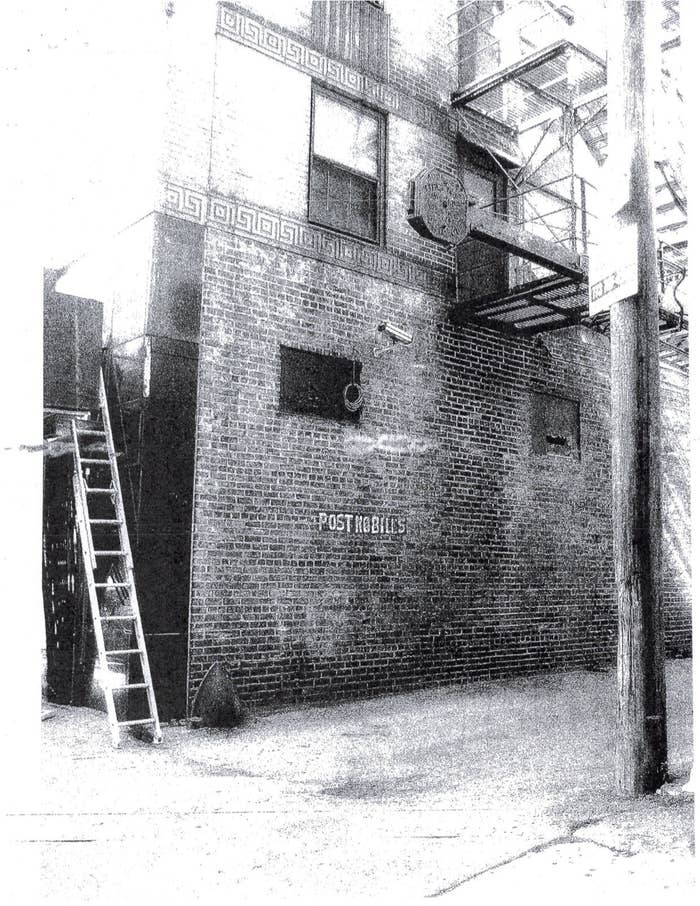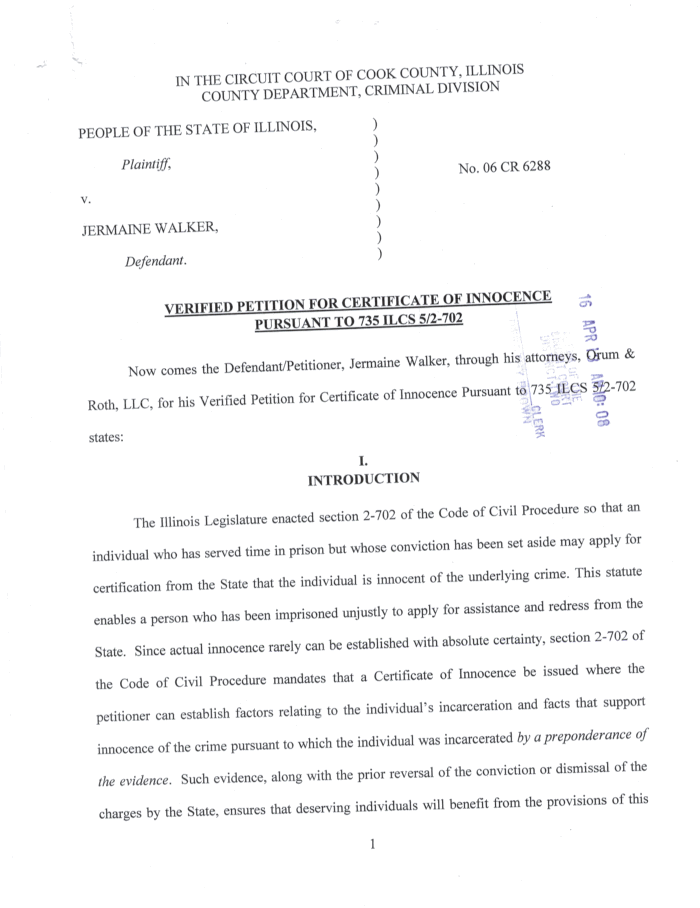
A Chicago man imprisoned for 10 years on drug charges has been freed after police officers and a state’s attorney investigator lied under oath and said there was no surveillance camera in the alley where they arrested him — even though there was.
Jermaine Walker was released from prison in late March. The judge called his conviction "outrageous," "disturbing," "unsettling," and "a severe injustice" after his lawyer found proof that there was, in fact, a surveillance camera in the alley during his 2006 altercation with three Chicago police officers.

What’s more is that while the camera did exist, it was revealed in witness testimony last month that it streamed only live video to security guards, and didn’t record what it captured.
All statements about the case in this article come from testimony and records filed in Illinois state courts — some of which are here — unless otherwise noted.
On Feb. 21, 2006, around 8:30 p.m., three Chicago police officers — Eric Reyes, Sebastian Flatley, and Sergeant Michael White — were driving around North Sheridan Road when someone flagged them down and told them that there were drug deals going on in the neighborhood, and that they should be on the lookout for a white Oldsmobile.
After 20 minutes, the officers saw a car that fit the description pulled over on the side of road. A man was leaning on the passenger side and appeared to be talking to one of the two men in the car. The man on the street, Dewey Brown, gestured to the driver to pull around the corner into an alley. The police followed and pulled up behind the Oldsmobile between the Lawrence Houses and the J.J. Peppers store.
When the officers got out of their Crown Victoria, Brown took off. Flatley chased him while Reyes and White confronted the two men in the Oldsmobile: Walker, the driver, and his brother, Russell.
Reyes later testified that as he was walking up to the car’s driver’s side, Walker tossed a golf ball–sized baggy of crack cocaine out the window. (Walker maintains police planted drugs on him.)
Walker initially refused to get out of the car. When he did, he said Reyes punched him in the stomach. The officers threw Walker to the ground and began beating him, he said. Walker, who knew there was a security camera mounted on the wall of the Lawrence Houses, told them, “What you guys are doing is wrong ... look you are on camera and I am going to sue you for brutality.”
Police arrested Walker, and Flatley later testified that when he searched Walker he found more crack cocaine. Walker was charged with dealing drugs within 1,000 feet of a school. He chose to represent himself.
At trial, the security camera became the central issue of the case.
Reyes and Flatley testified that there was no security camera in the alley. Their testimony was backed up by a Cook County State’s Attorney’s Office investigator Thomas Finnelly.
Finnelly, who was a Chicago police officer before retiring and joining the state’s attorney’s office, took photos of the scene. He testified that he visited the alley twice and never saw a security camera on the Lawrence Houses. His photos of the alley were shown at trial and didn’t depict a camera.
Walker argued that Finnelly’s photos showed an incomplete picture of the alley. He said that several of photos showed the building across from the Lawrence Houses, the J.J. Peppers, and said the photos of the Lawrence Houses were zoomed in, hiding the area where the camera was located. He petitioned the court to appoint him his own investigator, but was denied.
In her closing argument, the prosecutor for the state railed against Walker’s claim that a camera existed in the alley.
“There was a camera somewhere in the alley? Ladies and gentlemen, there is absolutely no evidence of that. Witness after witness after witness took that stand and told you there is no camera. You have pictures of the alley, including close-ups that show you there is no camera,” she told the jury. “If there was a camera, do you think this defendant and his brother would be stupid enough to deal drugs in front of it? Come on. Don’t you think that they would pick another alley? Get real. The police officers planting drugs. That’s the most baffling of all.”
"There was a camera somewhere in the alley? Ladies and gentlemen, there is absolutely no evidence of that."
On June 2, 2006, a jury found Walker guilty. He was sentenced to 10 to 22 years in prison.
Over the next several years, Walker filed motions for a new trial and an appeal. He argued that a camera existed in the alley and repeatedly asked to be granted an investigator to prove it. The state’s attorney’s office contended that they had well-established at trial that there was no camera. Every plea by Walker was denied.
In denying his appeal, the Illinois appellate court held that granting Walker’s request for a new investigation would be a “meaningless exercise.”
But Walker’s relentlessness came to the attention of attorney Ingrid Gill and the Cook County Public Defender’s Office.
Gill took the case and filed a post-conviction petition for Walker in May 2015, claiming that his due process rights had been violated because the camera he claimed was in the alley did in fact exist. To support this argument, they presented photos and videos showing the camera.
They also presented the signed affidavits of two Lawrence Houses front-desk workers who confirmed that the camera had been installed prior to the 2006 incident and that it fed video of the alley — but didn’t record it — directly to a video monitor at the front desk. It’s unclear if the camera was pointing at Walker and the officers during the incident.
After the revelation, the Cook County State’s Attorney’s Office opened an investigation. At a March 25, 2016, hearing, Celeste Stack, the head of special litigation, asked the judge to vacate the sentence against Walker and have him released immediately.
At the hearing, Judge Catherine Haberkorn apologized to Walker, telling him, “A severe injustice was done here,” and that she was deeply disturbed by the apparent lies told by Reyes, Flatley, and Finnelly at trial.
“[A]nd it is very disturbing and upsetting, especially as a judge, to be involved in a system where an officer, especially an officer of the court, would come in and swear under oath to something that was not true. That’s a terrible thing and very disheartening to find out that someone has done something like this,” Haberkorn said.
Haberkorn called the actions of the police officers and the investigator “outrageous” and told Walker, “I am so sorry that this has happened to you.” She vacated Walker’s sentence and set him free.
"I am so sorry that this has happened to you."
A Chicago Police Department spokesman told BuzzFeed News that he couldn’t comment on the case. He confirmed that Reyes, Flatley, and White are still employed with the department. Dean Angelo, the president of the Fraternal Order of Police in Chicago, said, "We presently have no knowledge of the present status of this investigation. Pending any further information, we would have nothing to offer." Walker’s lawyer said he wouldn’t be interviewed because he is considering filing a federal civil rights lawsuit.
Walker was released after serving 10 years. On April 14, his attorney, Mark Roth, filed a certificate of innocence on Walker’s behalf. If granted, it will expunge Walker’s criminal record. It will also allow Walker to file a claim in the Illinois Court of Claims for compensation. Walker may obtain up to $170,000 for the time he spent in prison, his attorney said.
Russell Walker and Dewey Brown took plea deals, Roth said. They each served one year.
In a statement to BuzzFeed News, Roth called Walker’s case “a classic example of what is wrong with the criminal justice system.”
“He was in prison from age 29 to 39. At the time he was convicted, Mr. Walker was on a full scholarship to college. He had a promising future. He is extremely intelligent. He lost a career, getting married, having children — everything people do between those years in your 20s and 30s. Now, he can’t just pick up where he left off,” Roth said.
UPDATE: The Circuit Court of Cook County has officially granted Walker's certificate of innocence.
“I feel like two Willis Towers were removed from my shoulders. It’s a joyous moment,” Walker told BuzzFeed News.

